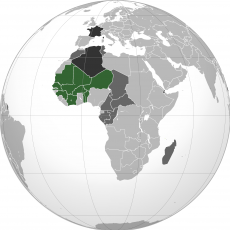
Email: nadege.preston@hotmail.com
Total Article : 82
About Me:Hi I’m Nadege and I study French at the University of Leeds, and I have just completed my third year abroad in Montpellier studying literature and enjoying the sunshine! I love art; painting and being creative, as well as photography and baking. Travelling is my favourite hobby at the moment; experiencing the French language and culture. I hope you enjoy reading some of my articles!

Continuing the analysis of Senegal’s language situation, the way in which all language varieties as well as the official language; French, are recognised can be seen in the speech Abdou Diouf made in the presidential elections on the 1st May 1988. Diouf spoke in formal French, as expected at official events. However, Diouf was the first President to also address the Wolof speaking population using the Wolof language which is spoken by three-quarters of the Senegalese population. Non-francophones responded well to this speech as it showed how other familles de langues are important. The Senegalise policy makers therefore clearly value the interests of the entire population.
To add to this, religion in Senegal is open to various faiths, showing how freedom is enshrined into the constitution and reflects why religious and linguistic groups coexist in harmony. However, it is important to note that there remains a complex linguistic situation in Senegal because French is the official language used in all governmental affairs and this may suggest that French is still of a higher status than the language varieties which were spoken in Senegal before colonisation. This said, according to statistical information, in daily life, Wolof is spoken 62% of the time, while French is spoken 37% of the time, and other African languages 1% of the time. This highlights the fact that French is not highly used in the lives of citizens, which suggests that French was probably only chosen as the official language on the basis of developing the country, rather than on the basis of the individual’s choice in society.
This means that the official language was probably not chosen to create national identity, as many citizens cannot indentify with this language. However, due to the multiple language varieties recognised in Senegal, national unity is created through this recognition, accepting every person’s culture. Senegal’s linguistic situation therefore differentiates to Algeria’s as there is a higher linguistic diversity, but the language policy is more logical as the national languages address the majority of the population, therefore creating more unity. However, the official language; French, is not recognized by all, meaning that a complex linguistic situation remains.
To conclude these past few articles about Francophone Africa, it is clear that since colonisation, African countries have encountered great difficulties in creating effective language policies as an independent nation due to their high linguistic diversity, the complex status of their languages and the role that language adopts to also be used as a political tool.
IMAGE URL
http://upload.wikimedia.org/wikipedia/commons/1/14/French_west_africa.png

0 Comment:
Be the first one to comment on this article.